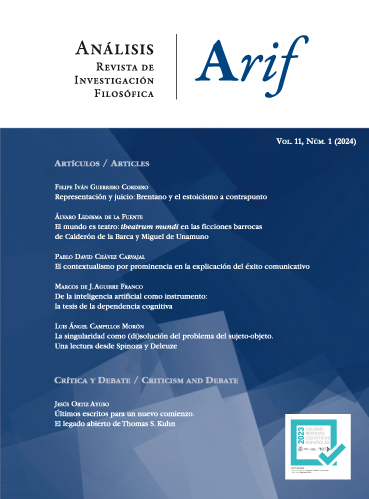Singularity as a (di)solution of the subject-object problem
A reading from Spinoza and Deleuze.
DOI:
https://doi.org/10.26754/ojs_arif/arif.202419983Abstract
Abstract: In this this paper we will reflect on the concept of singularity in Deleuze (according to his reading on Spinoza). We will present singularity as a way of dissolving the inveterate subject-object problem that runs through the history of philosophy. We will look for the attributes of singularity and its relations with the Spinozian concept of conatus. Here a political reading will be imbricated, according to the meanings of the forces that Deleuze takes from Nietzsche: the (active) singularities persevere in their potency, while the (reactive) entities generate impotence and Power. Later, we will insert necessity, freedom and will in this conceptual frame, we will stop at the critique of anthropocentrism. We will conclude associating the problem of measurement in science with our study and anchoring various current ecological-political proposals in this Spinozian-Deleuzian ontological framework.
Keywords: singularity; Spinoza; Deleuze; subject; object.
Downloads
Downloads
Published
How to Cite
Issue
Section
License
Copyright (c) 2024 LUIS ANGEL CAMPILLOS MORON

This work is licensed under a Creative Commons Attribution-NonCommercial-NoDerivatives 4.0 International License.
Los autores que publican en esta revista están de acuerdo con los siguientes términos: los autores conservan los derechos de autor y garantizan a la revista el derecho de ser la primera publicación del trabajo al igual que licenciado bajo una Creative Commons Reconocimiento-No Comercial-Sin Obra Derivada 4.0 (CC BY-NC-ND) que permite a otros compartir el trabajo con un reconocimiento de la autoría del trabajo y la publicación inicial en esta revista. Los autores pueden establecer por separado acuerdos adicionales para la distribución no exclusiva de la versión de la obra publicada en la revista (por ejemplo, situarlo en un repositorio institucional o publicarlo en un libro), con un reconocimiento de su publicación inicial en esta revista.






